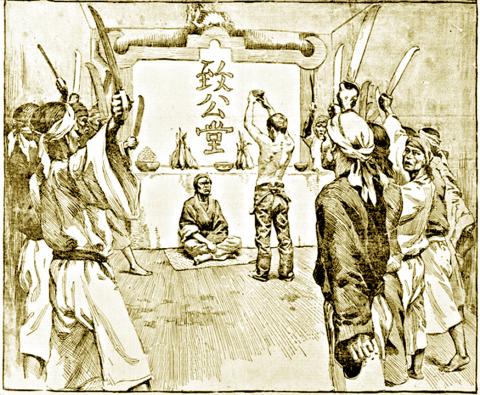Chinese practice
物以類聚
(wu4 yi3 lei4 ju4)

Photo: Wikimedia Commons
照片:維基共享資源
things congregate according to their nature
改革派作家威廉‧特納在其一五四五年諷刺天主教之作《The Rescuynge of the Romishe Fox》(拯救天主教狐狸)中,寫了這麼一句話:「Byrdes of on kynde and color flok and flye allwayes together」(同種類、同顏色的鳥,總是聚成一群、一起飛)。後來在一五九九年,英格蘭詞典編纂家約翰‧明舒所編的《西班牙語及英語辭典》中,則引用了一段文字:「Birdes of a feather will flocke togither」,這句話更接近現今所使用的英文諺語「Birds of a feather flock together」。由此可知,這個說法至少在十六世紀中葉就已為人所知,這隱喻當時就以這些類似的形式廣為使用。
從字面上看,「birds of a feather flock together」的意思是,同種的鳥類傾向聚成一群,反映出鳥類實際行為中的傾向;它所引伸出的意思,是指志趣相投的人傾向聚在一起。
這個諺語在用法上並沒有負面含義的暗示,比如說用來指盜賊或有殺人傾向的人。這句話所說的聚在一起的人,可以是充滿抱負的、愛幻想的,或是熱愛美食的人。
中文成語「物以類聚」,字面意義為「事物依其類型而聚集在一起」,它的含義就不那麼中性了。此語原作「方以類聚」,「方」字有兩種解釋:可指「道」,或可能是「人」字的訛誤,而應為「人以類聚」(同類的人會聚集在一起)。這個成語和「birds of a feather flock together」的含義非常接近,但中文的「物以類聚」往往帶有負面的意涵,用來表示問題人物傾向於聚在一起、互相勾結。
「方以類聚」一語最早出現於對古代占卜經典《易經》的論述《繫辭》中:「方以類聚,物以群分,吉凶生矣」(世上的人同類相聚,世上之物可依其群體分類,性質相近的東西會聚集在一起,若是同於善道則為吉,同於惡道則為凶,吉與凶之間的差異便是由此區分。)
此語後來以「物以類聚」這稍微變化的形式,透過後世通俗文學作品的傳布,進入了更廣大的語境中,例如晚明白話作家馮夢龍(西元一五七四~一六四五年)所著短篇小說集《醒世恆言》卷十七中的一句話:「自古道:『物以類聚』。過遷性喜遊蕩,就有一班浮浪子弟引誘打合」(有句古語說「物以類聚」,過遷這個人喜歡遊蕩,就有一群浪子自然而然相互吸引)。
(台北時報林俐凱譯)
俗話說「物以類聚」,想要知道他是什麼樣的人,請看他身邊有什麼樣的朋友。
(There’s a saying that goes “birds of a feather flock together.” If you want to know what kind of person he is, look at the friends he surrounds himself with.)
這犯罪集團的成員,各個都是前科累累,真是一丘之貉、物以類聚。
(All those gang members have a list of prior convictions as long as your arm. Talk about like attracts like, birds of a feather....)
英文練習
birds of a feather flock together
In his 1545 papist satire The Rescuynge of the Romishe Fox (The Rescuing of Romish Fox), the reformist writer William Turner used the phrase: "Byrdes of on kynde and color flok and flye allwayes together" (birds of one kind and color always flock and fly together). This was followed in 1599 by a citation in the Dictionarie in Spanish and English compiled by the English lexicographer John Minsheu, which reads “Birdes of a feather will flocke togither,” a version closer to the proverb currently in use in English: “birds of a feather flock together.” The phrase, then, has been known since at least the mid-16th century, and the metaphor was widely used, in one version of the other, around that time.
Literally, “birds of a feather flock together” means that birds of the same species tend to form groups with each other, reflecting an actual behavioral tendency among birds; by extension, it refers to the propensity of people of like mind to congregate.
In usage, there is no suggestion that a negative meaning is implied, as would be the case were it to refer to thieves, or people with murderous tendencies, for example. It could just as likely refer to ambitious people, or to people with their heads in the clouds, or people with a passion for food.
The Chinese idiom, 物以類聚, literally “things group according to type,” is less neutral. Originally written as 方以類聚, where 方 has been interpreted either as meaning dao 道 (the Way) or as being a textual corruption of ren 人 (person), to give “人以類聚" (lit: people of a certain type group together), it is very close to the meaning of “birds of a feather...,” although the Chinese phrase does tend to carry a negative connotation, that is, people of questionable character tend to group together.
The phrase 方以類聚 originally appeared in the xici (Great Treatise) commentary of the ancient divination classic the yijing (Book of Changes), in the phrase 方以類聚,物以群分,吉凶生矣 (all people on Earth congregate according to kind; all things on Earth can be distinguished by how they group together. Things of a similar nature get together, and if these are good, then it is auspicious; if they are bad, then it is inauspicious. This is how the difference between the auspicious and the inauspicious was established.)
The idiom came into the wider language in the slightly altered form of 物以類聚 through later popular literary works, for example the sentence 自古道:『物以類聚』。過遷性喜游蕩,就有一班浮浪子弟引誘打合 (There’s an old saying, which goes “birds of a feather, flock together.” Guo Qian likes to fool around, and that group of philanderers naturally gravitated toward each other) from chapter 17 of the short story collection Stories to Awaken the World by the late Ming Dynasty vernacular writer Feng Menglong (1574–1645).
(Paul Cooper, Taipei Times)
It didn’t take him long to find other criminal elements within the city. Birds of a feather...
(他在城裡很快又找到一批狐朋狗黨一起為非作歹了,真是物以類聚。)
Do you think people with similar personalities make good couples? Is it a case of “birds of a feather” or “opposites attract”?
(你覺得個性相近的人在一起會是一對佳偶嗎?到底會是「物以類聚」,還是「異性相吸」?)

Thailand and Cambodia are engaged in their worst fighting in over a decade, exchanging heavy artillery fire across their disputed border, with at least 30 people killed and tens of thousands displaced. Tensions began rising between the Southeast Asian neighbors in May, following the killing of a Cambodian soldier during a brief exchange of gunfire, and have steadily escalated since, triggering diplomatic spats and now, armed clashes. WHERE DOES THE DISPUTE ORIGINATE? Thailand and Cambodia have for more than a century contested sovereignty at various undemarcated points along their 817km land border, which was first mapped by France in 1907 when Cambodia was

Alan Turing, celebrated as the “father of computer science,” was a brilliant mathematician and scientist. Born in London in 1912, Turing showed exceptional talent in mathematics and science from a young age. At 16, he understood Albert Einstein’s work without difficulty. This intelligence carried him through studies at Cambridge University and later at Princeton University in the US, where he further explored complex mathematical theories. In 1936, Turing introduced the concept of the Turing machine, a theoretical device for solving mathematical problems. He described it as having an infinite tape on which symbols could be read, interpreted, and modified. With simple

A: After touring Taipei, the play Life of Pi is now heading to Taichung. You wanna go? B: Did you forget? We’re going to Taipei this weekend to see the musical Sunset Boulevard and go to Japanese pop diva Ayumi Hamasaki’s concert. A: Oh yeah, that’s right. The classic composed by Andrew Lloyd Webber is touring Taiwan for the first time. B: I heard that it’s adapted from a 1950 film with the same title. A: And the show will feature legendary soprano Sarah Brightman, who is finally returning to the musical stage after 30 years. We can’t miss it. A: 在台北巡演後,戲劇《少年Pi的奇幻漂流》本週起將移師台中。要去嗎?

A: Apart from the musical Sunset Boulevard, Japanese pop diva Ayumi Hamasaki is also touring Taiwan after a 17-year wait. She’s holding two concerts starting tonight. B: Ayu has the most No. 1 hits of any Japanese solo artist, with 33 total. A: “Time” magazine even crowned her as “The Empress of Pop.” B: She staged shows in Taipei back in 2007 and 2008, causing an “Ayu fever” across Taiwan. A: Unfortunately, the singer has been deaf in her left ear since 2008, and is gradually losing hearing in her right ear. I’m so excited to see her singing in Taipei again. A: 除了音樂劇《日落大道》,日本歌后濱崎步睽違17年,今晚起在台北熱唱兩場。